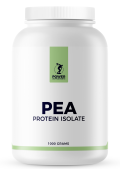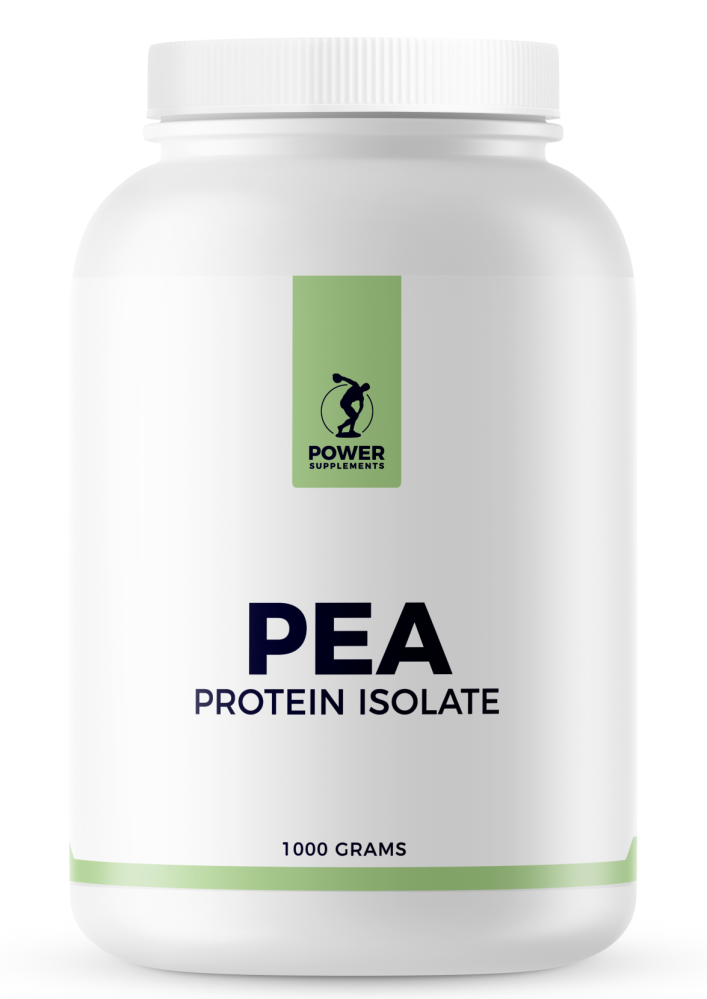This website uses functional cookies. If you click 'Accept', we also use analytical cookies (see our privacy page). If you prefer not to, click 'Decline'.

| Quality tested annually by independent laboratory. View the laboratory analysis (.pdf) |

1000 grams of pea protein powder (from peas).
Mix 1 scoop of Pea Protein Isolate (25-30 grams) with milk (250-300 ml), water (300-350 ml), juice (250-300 ml) or prepare your own favorite mix recipe.
Note: If mixed with water, we recommend using more fluid (300ml to 350ml). Pea Protein becomes thicker in combination with water compared to for example milk. Preferably use water from the fridge for the best flavor (water from the tap is often too warm!).
Dosage with sports:
Take 1 to 1.5 scoop of Pea Protein Isolate before and/or after training, or if the food doesn't contain enough protein. Use up to 3 scoops per day.
Dosage with protein diet:
Take 1 to 1.5 scoop of Pea Protein Isolate with a serving of vegetables as nutritious low-carb meal. Use up to 3 scoops per day.
- Pea protein isolate
- Natural flavoring
- Steviol glycosides sweetener from stevia plant (E960)
Allergens
Legumes.
Alternative to whey and casein protein
This dietary supplement is a concentrated source of high quality vegetal protein. It also contains naturally occurring fibers, and is sweetened with an extract of the stevia plant. Stevia Pea Protein Isolate is suitable for vegetarians and vegans alike. It is free from milk, soy, lactose, gluten and artificial additives.
The advantages of pea protein isolate:
Protein isolate from peas
Milk proteins such as whey protein and casein protein are very popular. They taste good and have an excellent nutritional value. However, not everyone tolerates these proteins well. Pea Protein Isolate is an alternative protein supplement for people with an allergy or intolerance.
Much needed variety?
Prolonged use of large amounts of the same type of protein could cause the body to develop an At least, this is claimed by some power sports gurus. We have not come across any scientific evidence backing this claim.
But if indeed this is the case then Pea Protein Isolate offers a good alternative for whey and casine proteins. The content of BCAAs and other essential amino acids in pea protein is quite high. That means that the human body responds well to pea protein for constructive and restoration purposes.
Special amino acids in pea protein
Pea protein isolate is a vegetable protein with a high content of essential amino acids. The essential branched chain amino acids (BCAAs) are in particular represented very well with over 20% content. The high content of essential amino acids and BCAAs makes pea protein suitable for athletes and people on a protein diet.
Furthermore, pea protein is rich in the amino acid (L-)arginine. It contains about 2 grams of arginine per scoop. That's about four times more than in the popular whey protein. The amino acid arginine can support your health in many different ways. Aside from that, this amino acid contributes to a good sporting performance and stimulates fat loss.
There is growing evidence that L-arginine reduces fat storage in humans and animals with obesity. Studies show that administration of additional L-arginine promotes the growth of mitochondria. This supports the energy production in the cells of the body.
In addition, it enhances the development of brown fat tissue.This is very beneficial because the high energy consumption by brown fat tissue makes it easier to get an athletic body.
The very promising L-arginine is also a safe and cost-effective amino acid to reduce body fat, build the muscles and promote metabolism.
(roughly summarized and translated from: "Beneficial effects of L-arginine on Reducing obesity: potential mechanisms and Important Implications for human health").
# In accordance with legislation is the equivalent salt content (sodium chloride) calculated on the basis of the actual sodium content in the product. The sodium content is 640 mg per scoop. This product does not contain added salt.
| Per 100 g | Per 30 g | |
| Energy | 1547 kJ / 366 kcal | 464.1 kJ / 109.8 kcal |
| Protein | 79.9 g | 24.0 g |
| Carbohydrates | 3.8 g | 1.1 g |
| - of which sugars | 0.1 g | 0.0 g |
| - of which lactose | 0.0 g | 0.0 g |
| Fat | 2.9 g | 0.9 g |
| - of which Saturated | 0.5 g | 0.2 g |
| Fiber | 2.2 g | 0.7 g |
| Salt | 1.8 g | 0.5 g |
| * Depending on flavour, composition may vary slighlty | ||
| Quality tested annually by independent laboratory. View the laboratory analysis (.pdf) |